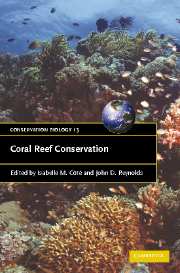Book contents
- Frontmatter
- Contents
- List of contributors
- Foreword
- Preface
- Part I Setting the stage
- Part II Uses and abuses: ecological and socio-economic issues
- Part III The way forward: tools and approache
- 9 New approaches to estimating recent ecological changes on coral reefs
- 10 Assessing the effectiveness of marine protected areas as a tool for improving coral reef management
- 11 Environmental impact assessment for coral reefs: advocating direct protective approaches
- 12 Time for a third-generation economics-based approach to coral management
- 13 Collaborative and community-based conservation of coral reefs, with reference to marine reserves in the Philippines
- 14 Education as a tool for coral reef conservation: lessons from marine protected areas
- 15 Adaptive institutions for coral reef conservation
- 16 Coral reef restoration with case studies from Florida
- 17 Redesigning coral reef conservation
- 18 Coral reef coda: what can we hope for?
- Index
- Plate section
- References
15 - Adaptive institutions for coral reef conservation
Published online by Cambridge University Press: 05 June 2012
- Frontmatter
- Contents
- List of contributors
- Foreword
- Preface
- Part I Setting the stage
- Part II Uses and abuses: ecological and socio-economic issues
- Part III The way forward: tools and approache
- 9 New approaches to estimating recent ecological changes on coral reefs
- 10 Assessing the effectiveness of marine protected areas as a tool for improving coral reef management
- 11 Environmental impact assessment for coral reefs: advocating direct protective approaches
- 12 Time for a third-generation economics-based approach to coral management
- 13 Collaborative and community-based conservation of coral reefs, with reference to marine reserves in the Philippines
- 14 Education as a tool for coral reef conservation: lessons from marine protected areas
- 15 Adaptive institutions for coral reef conservation
- 16 Coral reef restoration with case studies from Florida
- 17 Redesigning coral reef conservation
- 18 Coral reef coda: what can we hope for?
- Index
- Plate section
- References
Summary
INTRODUCTION
Institutions are the formal and informal rules that govern the way natural resources such as coral reefs are managed. They range from policy and legislative frameworks to local informal collective action, property rights, and norms and rules. Protected areas and other conservation and management designations, regulations, laws and local management networks are therefore all institutions relevant to conservation.
There is a substantial theoretical and empirical literature that discusses the characteristics of apparently ‘successful’ institutions for terrestrial protected area management (Agrawal, 2001; Pretty, 2002; McShane and Wells, 2004). However, relatively little social science analysis has been devoted to marine protected areas or coral reefs. What work has been done has focused on coastal management and, to a lesser extent, fisheries (e.g. Alcala et al., this volume).
This chapter examines institutional dimensions of marine protected areas (MPAs) and whether the design principles identified for terrestrial protected areas are applicable to marine resources. It argues that successful institutions for managing resources such as coral reefs should be efficient and effective in meeting their goals, be equitable in their outcomes and enjoy legitimacy among the relevant actors and institutions. To do this they need to be adaptive. Adaptive institutions are those that are able to deal with dynamic and fluctuating ecological conditions and resources; that recognize and manage a range of users and uses, and the trade-offs between them; and which can learn from and adapt to experience.
- Type
- Chapter
- Information
- Coral Reef Conservation , pp. 455 - 477Publisher: Cambridge University PressPrint publication year: 2006

